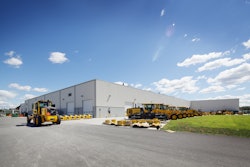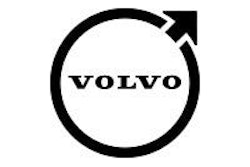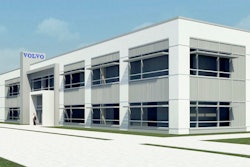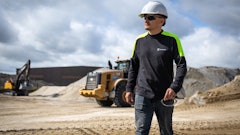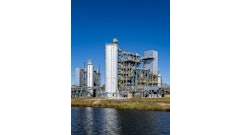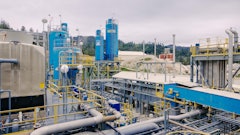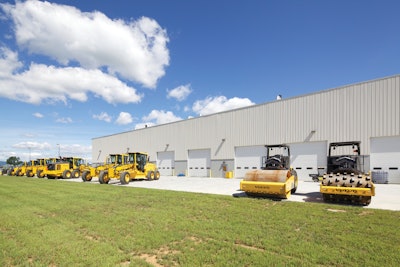
Achieving LEED certification is a challenging, yet rewarding, process for any company or project. For a manufacturing facility, it can be extra challenging.
“LEED certification is designed more for office buildings rather than heavy manufacturing plants,” explains Chris Stone, Director of Industrial Support and Project for Volvo Construction Equipment’s (Volvo CE) Shippensburg facility.
“When we began the Shippensburg campus expansion project, we included LEED certification as a key objective. When reviewing the details about the LEED program, we realized that it is more difficult for heavy manufacturing companies to become certified than for office buildings and schools. Many of the possible credits for certification didn’t apply to us, so we were at an immediate disadvantage. The Volvo project team, the engineering firms and the construction management company worked together diligently to find enough credits to not only meet basic certification, but to achieve silver certification.
“We are extremely honored to reach such a prestigious level, and it is a very proud moment for the project team and Volvo Shippensburg,” he adds.
Volvo’s Shippensburg facility expansion is truly an innovative and environmentally friendly building. The facility, which was purchased in 2007 and recently completed a $30 million expansion, has focused on sustainability in its design, construction, operation and culture.
“We wanted to create a work environment that is not only sustainable but promotes eco-friendly practices,” explains Stone. “Every aspect of our facility emphasizes the importance of our environment. In this way, we aim to create a culture that extends beyond the boundaries of our facility and into our employees’ everyday lives.”
Sustainable behavior in action
The Shippensburg facility began its quest for LEED certification during its design phase more than two years ago. Numerous environmental innovations were incorporated such as a customized building automation system, highly efficient lighting and skylights, substantial insulation, low-volume plumbing fixtures and low-maintenance outdoor plants that do not require fertilizers or watering. Even improving indoor air quality was designed with increased ventilation and the use of low-emitting interior finishing products (adhesives, paint, etc.).
The Shippensburg expansion created a materials service center and an assembly hall, designed to improve manufacturing flow and increase production space.
During construction of the 200,000- square-foot facility, sustainable practices covered both building materials and waste materials.
Many building products were sourced locally or used recycled materials, and a total of 75% of construction waste was diverted from disposal either through recycling or recovery for reuse.
Once up and running, the Shippensburg facility adopted sustainable manufacturing methods to continue its efforts toward LEED certification. This covers almost every aspect of the facility’s activity, down to the smallest detail. For example, there are three different recycling solutions for the packaging that Volvo receives its materials, including adopting Volvo’s own reusable packaging solution called emballage.
“Volvo acts with understanding and care for the life cycle of every component and material we use and create,” says Stone. “In some cases our methods may not seem like the grandest undertaking, but many modest changes add up to make a huge difference.”
Volvo also seeks to develop relationships with companies that share its values for environmental care. ISO 9001, 14001 and OHSAS 18001 certifications are among the qualities it looks for and encourages in suppliers.
Simple things count
The quest for LEED certification does not stop at the facility’s operation. The accolade is as much about physical changes as it is about creating the right culture. The Shippensburg facility uses visual aids — such as recycling bins — and eco-friendly options to build environmental awareness among employees.
“Simple things like providing bicycle racks, preferred parking for low-emission vehicles and carpooling can shine a sustainable light on everyday activities and promote the need for environmentally conscious solutions,” explains Stone.
Volvo is also creating a comprehensive environmental training program for all new employees to instill the importance of eco-friendly practices at an early stage.
“For Volvo, the most important aspect of environmental care is the promotion of eco-friendly practices — both at work and at home,” concludes Stone. “We aim to be one of the most forward-thinking companies in the world. Achieving LEED certification measures our total commitment to the environment. There are few manufacturing facilities in America that are LEED certified, which makes us even more proud and determined to reach our goal.”




